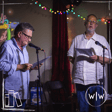
42 Juliet Pickering | Literary Agent
Adult literary agent and the RNA's Agent of the Year 2021, Juliet Pickering drops in to chat about the exciting year that lead up to her being awarded Agent of the Year. We talk about a couple of her RNA authors, Sue Moorcroft and Annie Robertson, and their journey to publication as well as the wider industry and its seasonality. And we find out exactly how Juliet approaches a submission at Blake Friedmann and what she thinks are best practices for authors to focus on.
Signing up to the Patreon will give you access to the Discord server, where you'll be able to interact directly with Jamie as well as many of the previous agents, authors and editors who have been on the show. You'll also be able to see who the upcoming guests are and put forward questions for Jamie to ask them.
Get a whole month with WriteMentor's Hub for free using the coupon code 'Write&Wrong'.
The Chosen Ones and Other Tropes
Jamie, Melissa and Noami talk about the best and the worst writing tropes!
Click here to find all of our guests' books as well as the desert island library over at bookshop.org.
Click on this referral link to get 30% off your first three months with Zencastr.



















